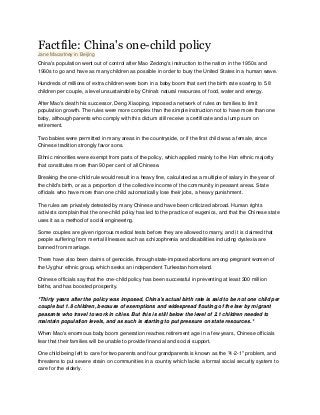
P timeonline
- 1. Factfile: China's one-child policy Jane Macartney in Beijing China's population went out of control after Mao Zedong's instruction to the nation in the 1950s and 1960s to go and have as many children as possible in order to bury the United States in a human wave. Hundreds of millions of extra children were born in a baby boom that sent the birth rate soaring to 5.8 children per couple, a level unsustainable by China's natural resources of food, water and energy. After Mao's death his successor, Deng Xiaoping, imposed a network of rules on families to limit population growth. The rules were more complex than the simple instruction not to have more than one baby, although parents who comply with this dictum still receive a certificate and a lump sum on retirement. Two babies were permitted in many areas in the countryside, or if the first child was a female, since Chinese tradition strongly favor sons. Ethnic minorities were exempt from parts of the policy, which applied mainly to the Han ethnic majority that constitutes more than 90 per cent of all Chinese. Breaking the one-child rule would result in a heavy fine, calculated as a multiple of salary in the year of the child's birth, or as a proportion of the collective income of the community in peasant areas. State officials who have more than one child automatically lose their jobs, a heavy punishment. The rules are privately detested by many Chinese and have been criticized abroad. Human rights activists complain that the one-child policy has led to the practice of eugenics, and that the Chinese state uses it as a method of social engineering. Some couples are given rigorous medical tests before they are allowed to marry, and it is claimed that people suffering from mental illnesses such as schizophrenia and disabilities including dyslexia are banned from marriage. There have also been claims of genocide, through state-imposed abortions among pregnant women of the Uyghur ethnic group, which seeks an independent Turkestan homeland. Chinese officials say that the one-child policy has been successful in preventing at least 300 million births, and has boosted prosperity. *Thirty years after the policy was imposed, China's actual birth rate is said to be not one child per couple but 1.8 children, because of exemptions and widespread flouting of the law by migrant peasants who travel to work in cities. But this is still below the level of 2.1 children needed to maintain population levels, and as such is starting to put pressure on state resources.* When Mao's enormous baby boom generation reaches retirement age in a few years, Chinese officials fear that their families will be unable to provide financial and social support. One child being left to care for two parents and four grandparents is known as the "4-2-1" problem, and threatens to put severe strain on communities in a country which lacks a formal social security system to care for the elderly.
- 2. *The policy has also produced an unnatural gender imbalance, as couples use legal and illegal means to ensure that their only child is a son. There are 117 men to each 100 women in China compared with the 108:100 imbalance in India, where sons are also preferred and female foetuses are sometimes aborted or baby girls left exposed to die. Chinese officials estimate that by 2020 there will be 30 million men known as "bare branches", unable to find a wife to marry and have their own child. Another consequence of the one-child rule has been the creation of a generation of "little emperors", indulged and cosseted boy children who are often overweight, arrogant and lacking in social skills.* In the cities, a new class of city worker has arisen with a Western-style reluctance to have more than one child, because they want to preserve their rising standard of living. Although all Chinese feel that the one-child policy has been a good thing for their country, most say they personally wish they could have had more children. Officials are said to fear that if the policy is simply lifted overnight, there will be a population explosion. http://www.timesonline.co.uk/tol/news/world/asia/article3452460.ece
